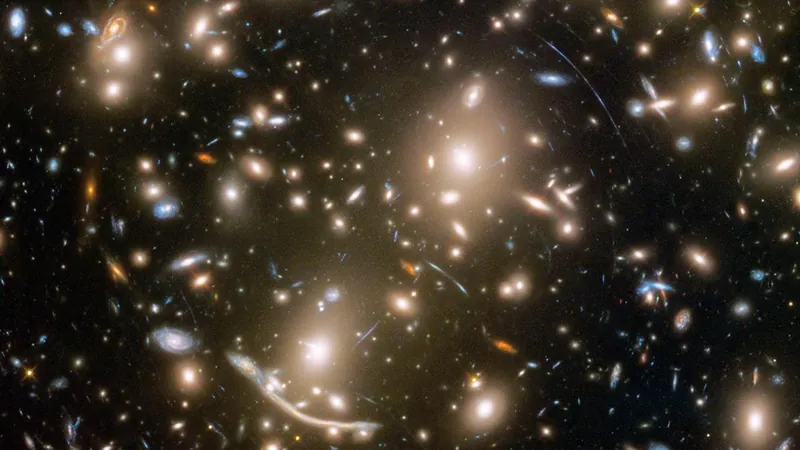
The Universe is Expanding Faster Than Ever: Are We on the Brink of a Cosmological Revolution?
2025-01-20
Author: Ling
The Hubble Tension
A recent study has intensified what scientists are calling the 'Hubble tension,' highlighting a staggering revelation: the universe is expanding at a rate that defies our current understanding of physics. This revelation, which stems from measurements made by both the Hubble Space Telescope and the state-of-the-art James Webb Space Telescope, suggests that the speed of the universe's expansion is inconsistent depending on the observational point in space.
Published on January 15 in The Astrophysical Journal Letters, this new research featuring a local galaxy cluster throws into question the very foundation of cosmology. Lead author Dan Scolnic, a professor of physics at Duke University, stated, 'This is saying, to some respect, that our model of cosmology might be broken.'
Understanding the Hubble Constant
To understand this issue, one must look at the Hubble constant, the critical value that gauges the universe's expansion speed. Two prime methods are commonly employed to estimate it. The first method involves studying minute fluctuations in the cosmic microwave background (CMB), a remnant glow from the universe's infancy shortly after the Big Bang, approximately 380,000 years ago. The second method, more applicable to the later stages of the universe's evolution, leverages the properties of Cepheid variable stars. These pulsating stars, which change brightness over time, have a known relationship between their brightness and pulsation period that allows astronomers to determine their distances accurately.
Discrepancies in Measurements
However, discrepancies arise here. The CMB data derived from the European Space Agency's Planck satellite suggested a Hubble constant of roughly 67 kilometers per second per megaparsec (km/s/Mpc). This aligned with predictions from the standard cosmological model. Conversely, measurements obtained through the Cepheid distance ladder revealed an alarming expansion rate of 73 km/s/Mpc, a value significantly outside the Planck error margins, indicating that light from distant galaxies is traveling faster than expected.
Closing the Gap with DESI
As astronomers probe deeper into these discrepancies, various hypotheses have been proposed, with some experts suggesting potential systematic errors while others continue to confirm the gap with more precise measurements. In a bid to close this growing gap, Scolnic's team utilized data from the Dark Energy Spectroscopic Instrument (DESI), which meticulously tracks millions of galaxies to elucidate how the universe has evolved over time.
The DESI data also pointed toward a similarly troubling Hubble constant of 76.05 km/s/Mpc. However, uncertainties in measuring distances to the Coma galaxy cluster muddled prior conclusions. 'The DESI collaboration did the hard work, but their ladder was missing the first rung,' Scolnic explained. He then focused intently on obtaining this critical data, which meant studying 12 different Type Ia supernovae within the Coma cluster and successfully determining that it sits approximately 320 million light-years from Earth.
Refining the Hubble Constant
This refined measurement has adjusted the Hubble constant to 76.5 km/s/Mpc, further amplifying the tension between existing cosmological theories and new observations. The implications of this continuing disparity are monumental. Could this be the key to unlocking new theories of the universe that challenge the 40-year-old standard model of cosmology?
'We're at a point where we're pressing really hard against the models we've been using for two and a half decades, and we're seeing that things aren't matching up,' Scolnic concluded with palpable excitement. 'This may be reshaping how we think about the Universe, and it's thrilling! We are on the cusp of new discoveries in cosmology that may drastically alter our understanding of reality itself.'
Looking Ahead
The cosmic journey promises more surprises, and as the borders of our universe expand, the mysteries waiting to be unraveled grow ever more enticing. Keep watching the skies—who knows what awe-inspiring revelations are just around the corner?





 Brasil (PT)
Brasil (PT)
 Canada (EN)
Canada (EN)
 Chile (ES)
Chile (ES)
 Česko (CS)
Česko (CS)
 대한민국 (KO)
대한민국 (KO)
 España (ES)
España (ES)
 France (FR)
France (FR)
 Hong Kong (EN)
Hong Kong (EN)
 Italia (IT)
Italia (IT)
 日本 (JA)
日本 (JA)
 Magyarország (HU)
Magyarország (HU)
 Norge (NO)
Norge (NO)
 Polska (PL)
Polska (PL)
 Schweiz (DE)
Schweiz (DE)
 Singapore (EN)
Singapore (EN)
 Sverige (SV)
Sverige (SV)
 Suomi (FI)
Suomi (FI)
 Türkiye (TR)
Türkiye (TR)
 الإمارات العربية المتحدة (AR)
الإمارات العربية المتحدة (AR)